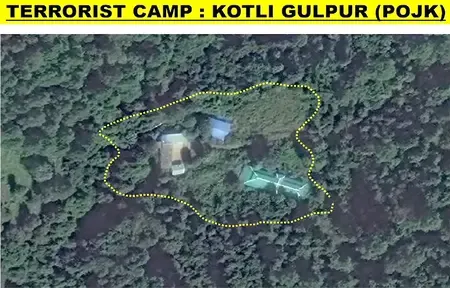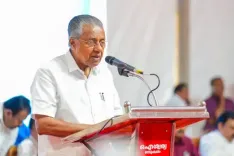Operation Sindoor: Has India's Bold Move Forced Pakistan to Confront Its Terror Proxies?

Synopsis
Key Takeaways
- Operation Sindoor targets known terror bases in Pakistan.
- Evidence shows Pakistan's state support for terrorism.
- The operation follows a tragic attack in Pahalgam.
- International community has largely overlooked Pakistan's actions.
- India's military capability to confront terror threats is evident.
New Delhi, May 11 (NationPress) Operation Sindoor has proven to be a pivotal success, compelling Pakistan to reckon with its longstanding support for terror groups and its involvement in global terrorism.
This operation transcends mere homage to terror victims or retaliation for the Pahalgam tragedies; it embodies India's steadfast commitment to combating the terrorism that Pakistan has perpetuated both within its borders and beyond.
The operation unveiled harsh realities about Pakistan, exposing elements that the U.S. mission to eliminate Osama Bin Laden failed to fully uncover, particularly the Pakistan Army's role in fostering terrorist factions. These groups have wreaked havoc in India for decades, resulting in the loss of countless innocent lives and driving the ethnic cleansing of Hindus from Kashmir.
India has long alerted the global community to Pakistan's involvement in multiple terrorist attacks on its territory. New Delhi has presented robust evidence, notably the capture of Ajmal Kasab, a terrorist apprehended during the Mumbai attacks on November 26, 2008, alongside proof linking Pakistan to the Pulwama attack. India has consistently raised alarms about Pakistan's intentions in Kashmir, a malicious agenda it has pursued since 1947, with the recent Pahalgam massacre being the latest incident.
Regrettably, the international community has often turned a blind eye. While there have been statements of concern, no decisive action has been taken against what can only be described as a terror factory. Although the United Nations and various nations have denounced specific Pakistani terrorists, they have refrained from condemning the nation as a whole. Operation Sindoor has delivered irrefutable evidence that cannot be overlooked.
The operation commenced on May 7 in retaliation for the terror assault in Pahalgam, Jammu and Kashmir, on April 22, which resulted in the deaths of 26 civilians. The attack was swiftly claimed by The Resistance Front (TRF), a faction of the Pakistan-based Lashkar-e-Taiba (LeT), which emerged following the abrogation of Article 370 in Jammu and Kashmir in August 2019.
The close association between Pakistan and TRF came to light during discussions at the United Nations Security Council regarding the Pahalgam attack. Pakistan's efforts to have the group's name omitted from the UNSC's condemnation statement raised questions about its connection to the incident.
Under Operation Sindoor, the Indian Armed Forces targeted nine specific terrorist infrastructures located in Pakistan and Pakistan-occupied Kashmir. These sites were known terror strongholds, and several designated terrorists were neutralized.
Footage surfaced showing Abdur Rauf, a U.S.-designated terrorist, leading prayers for those killed in the strike on the LeT headquarters in Muridke. Military officers were present at the funeral, where the terrorists were honored with a state funeral, draped in the Pakistani national flag, saluted by army personnel, and one coffin received a floral tribute from the Pakistan Army Chief.
Initially, five terrorists linked to Jaish-e-Mohammed and LeT were eliminated, identified as Mudassar Khadian Khas, Hafiz Muhammed Jameel, Mohammad Yusuf Azhar, Khalid alias Abu Akasha, and Mohammad Hassan Khan. Senior Pakistani military officials attended their funerals, and the viral photos and videos have further exposed the deep-seated connection between Pakistan's military and terrorism.
In a striking admission, Khawaja Asif, Pakistan's Defence Minister, acknowledged during a television interview that Pakistan has financially supported terrorist organizations for decades, particularly during the U.S.-led conflicts in Afghanistan. He referred to this involvement as 'dirty work' carried out for the United States and the West.
Asif even stated in Parliament that these terrorists serve as Pakistan's 'second line of defence,' asserting that 'students of madrasas would be deployed when needed.'
Additionally, the Director General of Inter-Services Public Relations (ISPR), Lieutenant General Ahmed Sharif Chaudhry, the spokesperson for India-Pakistan tensions, is the son of a notorious terrorist, Sultan Bashiruddin Mahmood, a known associate of Osama bin Laden.
Operation Sindoor has exposed the alarming ties between Pakistan's political and military establishments and jihadist elements. It is high time for the world to acknowledge these realities.
The evidence is indisputable - Pakistan stands as a rogue terror state that exploits religion to advance its agenda. India's operation has dismantled Pakistan's terror network in ways that previous efforts could not achieve, showcasing India's ability to compel Pakistan to submit.
This operation serves not only as a tribute to the women who lost their spouses in Pahalgam but also as a powerful demonstration of the Shakti of India's defense forces and political determination. It reveals that Pakistan's state policy endorses terrorism. Will the world continue to ignore the proofs presented by Operation Sindoor?
(Deepika Bhan can be contacted at deepika.b@ians.in)








